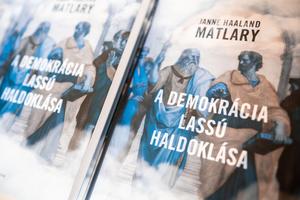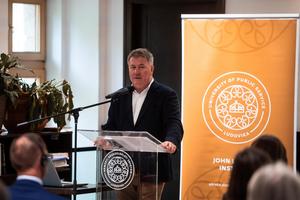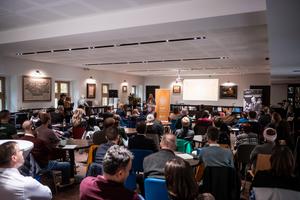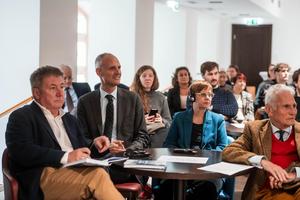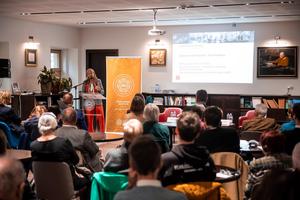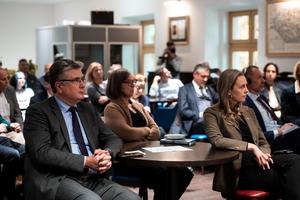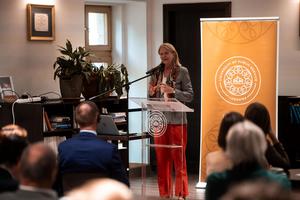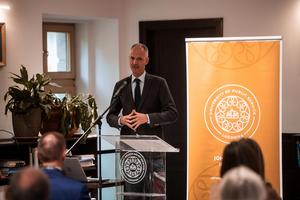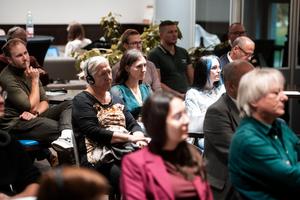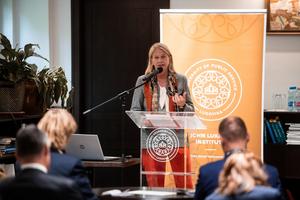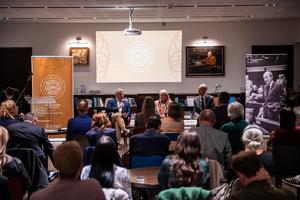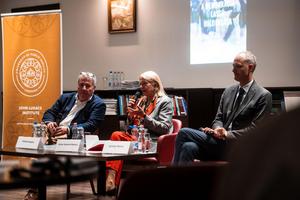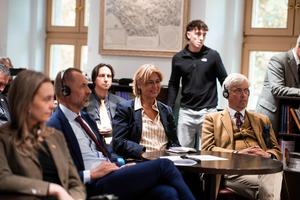How is it possible to preserve clarity of vision in a space so ideologized that the news and phenomena pouring onto us obscure the essence of the noblest idea of human coexistence, democracy? This question is addressed by the volume whose presentation was organized jointly by the John Lukacs Institute (JLI) of the Eötvös József Research Center (EJKK) of the Ludovika University of Public Service and the Otto Habsburg Foundation. On October 6, interested participants could familiarize themselves with Janne Haaland Matlary’s book The Slow Death of Democracy at the John Lukacs Salon.
The attendees of the event—including the ambassadors of the Kingdom of Norway and Germany, our country’s former ambassador to Oslo, and many students of Scandinavian studies at ELTE—were first welcomed by Gergely Prőhle, program director of JLI. He said that the volume had been recommended by Márton Ugrósdy, deputy state secretary heading the Political Directorate of the Prime Minister’s Office, and since he had often been impressed by Scandinavian mentality, clarity, and sobriety during his previous work as state secretary for foreign affairs, he received the suggestion that the work should be translated into Hungarian with pleasure and agreement. The merit of the book, he noted, is that it raises questions we hear about daily and think about in many ways. It does this candidly, without simplification, presenting arguments for and against, helping to initiate the discourse so much desired in our country. Regarding Janne Haaland Matlary, an interesting fact was also mentioned: her husband is Hungarian, and the surname Matlary was Magyarized from Mauks, thus indirectly connecting her to Mikszáth (whose wife was Ilona Mauks).
After this introductory praise, the author of the book, Janne Haaland Matlary, former deputy foreign minister of Norway, gave a lecture titled Democracy in Danger: When Everything Becomes Political. She first outlined the essence of the twin problem of wokeism and populism: both tendencies are characterized by bringing questions and topics into the political sphere to which they do not belong. Based on her impressions from universities across the Atlantic, she observed that on U.S. campuses, either wokeism or Trump-style suppression of opinion and intolerance is typical, even though the essence of liberal democracy should be pluralism. “In a democracy, we can say when we disagree,” she stated, adding that in many cases, this is not the case even in Scandinavia. She said that she tried to write a discussion-provoking book about this, whose goal is to start thoughts and raise issues. In her lecture, she spoke about where and how classical democracy went off course, and how it could be restored.
The lecture was briefly responded to by Márton Ugrósdy, deputy state secretary heading the Political Directorate of the Prime Minister’s Office. He highlighted the role of nation-states and the significance of municipalities, adding that accountability is extremely important at every level. Regarding the book People vs. Democracy mentioned in the lecture, he stated that there is no bulletproof answer to questions about abortion or woke issues, and from the perspective of our community’s future, it is important to define what we want to achieve, by which means, what the goal is, and what we are satisfied with. However, currently the approach has become so progressive that the foundations themselves are questioned: only the individual matters, and the sense of belonging to a community is missing.
The event continued with a roundtable discussion. Detailed information about the lecture and the event can be read on our university’s scientific portal, ludovika.hu.
Text: Lilla Kovács
Photo: Dénes Szilágyi
